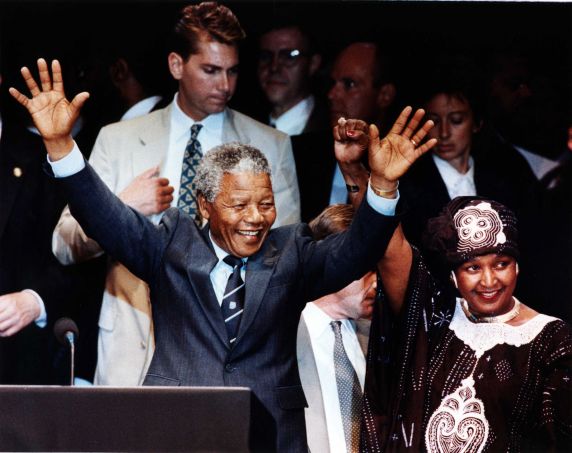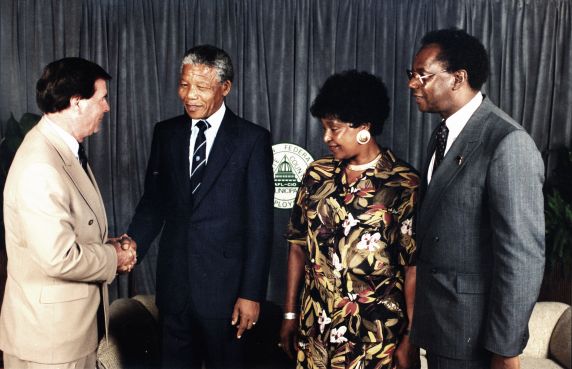Nelson Mandela, AFSCME, and Detroit in 1990
On June 28, 1990, AFSCME members welcomed Nelson Mandela to their biannual convention in Miami, Florida, chanting, “Mandela, yes! Apartheid, no!”
Mandela’s speech celebrated international solidarity and expressed his thanks for AFSCME’s continued work in the struggle against apartheid. As he addressed the delegates in Miami, he explained, "Your proud record of struggle has shown you have both the will and the determination to ensure that apartheid is ended now…In jail we could hear loud and clear your voice calling for our release.”
Just a few months earlier, Mandela had been a political prisoner of 27 years. His leadership in the African National Congress (ANC) threatened the existing political structure of apartheid, a system of physically separating groups by race and denying rights to black South Africans. By the early 1960s Mandela had already been arrested for minor infractions. In 1964, he was tried with several other defendants and received a life sentence for sabotage. He served his term on Robben Island from 1964-1982 and at Pollmoor Prison from 1982-1990.
International organizing efforts against apartheid pressured South African officials to make changes. On February 11, 1990, then-South African President F.W. de Klerk released Mandela to ecstatic crowds who recognized his liberation as a sign of apartheid’s demise. Mandela and de Klerk were jointly awarded the Nobel Peace Prize in 1993 “…for their work for the peaceful termination of the apartheid regime, and for laying the foundations for a new democratic South Africa.”
Immediately after Mandela’s release from prison, he began working more closely with those international organizations working against apartheid. He planned a multi-city U. S. tour in June, 1990 with the help of a committee of U. S. supporters, including AFSCME Secretary-Treasurer Bill Lucy. During the process, Lucy travelled to Namibia to meet with Mandela in person.
Though Mandela enjoyed the support of many labor unions in the U. S., his trip to the AFSCME convention was not coincidental. The Sun-Sentinel reported that an ANC representative told them, “If the [AFSCME] convention were on the moon, he’d be going to the moon.” The union participated heavily in anti-apartheid demonstrations and fundraising for the ANC. In addition to planning Mandela’s 1990 U. S. visit, Secretary-Treasurer Bill Lucy helped to found the Free South Africa Movement (FSAM), which created a coalition of labor, academic, and political leaders organizing against apartheid. Other members of AFSCME’s leadership, such as President Gerald McEntee, participated in demonstrations and regularly expressed their opposition to apartheid.

Immediately following his speech in Miami, Mandela flew to Detroit. Supporters packed Tiger Stadium to see the South African leader and hear him speak. He continued to draw on the connection between South African workers and American workers, stating, “It is with pleasure that I bring you the solidarity and greetings from your fellow workers in South Africa and their powerful trade union federation.”
Mandela chose to visit Detroit, in part, to thank the United Auto Workers for their work against apartheid. The UAW removed funds from banks with loans to South Africa as early as 1978, and, like AFSCME, participated in fundraising efforts for the ANC.
Mandela’s partnership with U.S. labor continued through the 1990s. In 1993, he visited Chicago and enjoyed the welcome of many labor groups, including AFSCME Council 31. Speaking to a room of union members, he explained, “You are the pillar of the liberation struggle throughout the world.” With continued support from international labor, apartheid in South Africa weakened further.
In 1994, South Africans elected Mandela President of South Africa in the first election including voters of all races. It was also Mandela’s first ever vote. He served one term as president, and continued to work for equality throughout his life.
Mandela died December 5, 2013, in South Africa.
Meghan Courtney was the AFSCME Archivist at the Walter P. Reuther Library of Labor and Urban Affairs from 2014 to 2016.
- mcourtney's blog
- Login to post comments
- Printer-friendly version


 Reddit
Reddit Facebook
Facebook LinkedIn
LinkedIn